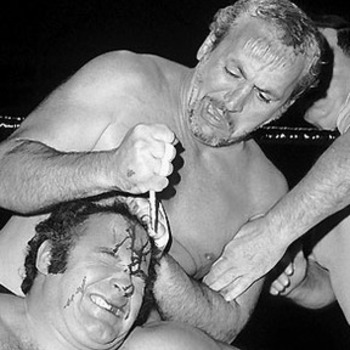Pushing back at Bill Gates’ favorite book of the last decade, Steven Pinker’s The Better Angels of Our Nature, philosopher John Gray argues in the Guardian that those who believe global violence to be on the wane are using accounting that’s too messy and theories too neat. We assign violence to backwardness when the cutting edge has the potential to be the sharpest of all. The essay comes from Gray’s new book, The Soul of the Marionette. An excerpt:
There is something repellently absurd in the notion that war is a vice of “backward” peoples. Destroying some of the most refined civilisations that have ever existed, the wars that ravaged south-east Asia in the second world war and the decades that followed were the work of colonial powers. One of the causes of the genocide in Rwanda was the segregation of the population by German and Belgian imperialism. Unending war in the Congo has been fuelled by western demand for the country’s natural resources. If violence has dwindled in advanced societies, one reason may be that they have exported it.
Then again, the idea that violence is declining in the most highly developed countries is questionable. Judged by accepted standards, the United States is the most advanced society in the world. According to many estimates the US also has the highest rate of incarceration, some way ahead of China and Russia, for example. Around a quarter of all the world’s prisoners are held in American jails, many for exceptionally long periods. Black people are disproportionately represented, many prisoners are mentally ill and growing numbers are aged and infirm. Imprisonment in America involves continuous risk of assault by other prisoners. There is the threat of long periods spent in solitary confinement, sometimes (as in “supermax” facilities, where something like Bentham’s Panopticon has been constructed) for indefinite periods – a type of treatment that has been reasonably classified as torture. Cruel and unusual punishments involving flogging and mutilation may have been abolished in many countries, but, along with unprecedented levels of mass incarceration, the practice of torture seems to be integral to the functioning of the world’s most advanced state.
It may not be an accident that torture is often deployed in the special operations that have replaced more traditional types of warfare. The extension of counter-terrorism to include assassination by unaccountable mercenaries and remote-controlled killing by drones is part of this shift. A metamorphosis in the nature is war is under way, which is global in reach. With the state of Iraq in ruins as a result of US-led regime change, a third of the country is controlled by Isis, which is able to inflict genocidal attacks on Yazidis and wage a campaign of terror on Christians with near-impunity. In Nigeria, the Islamist militias of Boko Haram practise a type of warfare featuring mass killing of civilians, razing of towns and villages and sexual enslavement of women and children. In Europe, targeted killing of journalists, artists and Jews in Paris and Copenhagen embodies a type of warfare that refuses to recognise any distinction between combatants and civilians. Whether they accept the fact or not, advanced societies have become terrains of violent conflict. Rather than war declining, the difference between peace and war has been fatally blurred.
Deaths on the battlefield have fallen and may continue to fall. From one angle this can be seen as an advancing condition of peace. From another point of view that looks at the variety and intensity with which violence is being employed, the Long Peace can be described as a condition of perpetual conflict.
***
Certainly the figures used by Pinker and others are murky, leaving a vast range of casualties of violence unaccounted for.•
Tags: John Gray, Steven Pinker

